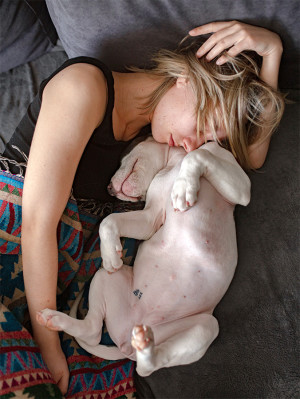Why Does My Dog Keep Shaking Their Head?
They can’t be saying no that much.

Share Article
In this article:
Why Do Dogs Shake Their Heads? Common Reasons for Dog Head Shaking Other Causes of Dog Head Shaking What Does Common Head Shaking Behavior Look Like What Does Abnormal Head Shaking Behavior Look Like When to Visit the Vet for Head Shaking
If you’ve noticed your dog shaking their head frequently, it could be a sign of discomfort or an underlying health issue. While occasional head shaking is normal, other causes include ear infection, yeast infection, allergies, or neurological disorders.
Why do dogs shake their heads?
We all have to scratch an itch sometimes, right? Dogs will shake their heads to relieve itching, dislodge material, or as a response to discomfort. Dogs shaking their heads is completely natural. However, when head shaking and scratching becomes constant or seems uncontrollable, it could be signs of an underlying issue.

Common reasons for dog head shaking
Otitis externa is inflammation of the external ear canal and the most common cause of frequent head shaking in dogs. Some dogs are more prone to ear issues than others, especially those breeds with long, floppy ears that trap debris and moisture. But any dog can develop problems that result in constant head shaking. Common reasons for head shaking in dogs include:
Ear infections
Ear infections caused by bacteria and yeast are a common cause of constant head shaking in dogs. Beyond head shaking, ear infections can result in discharge, odor, inflammation, redness, and pain in a dog’s ears. Infections can be isolated to one ear or develop in one or both ears at the same time.
Common bacterial causes include Staphylococcus, Streptococcus, Pseudomonas; yeast infections are caused by Malassezia. It’s not uncommon for irritated ears to be infected with both bacteria and yeast at the same time.
Allergies
Dogs can have allergies to food, pollen, or other environmental triggers. Allergic dogs will often develop itchiness that can manifest anywhere on their body, with the ears and paws being the most common areas affected. A pup suffering from a flare up of allergies may shake their head constantly in an attempt to relieve the itch.
Ear parasites
Dog ears can be a popular hiding spot for parasites, especially ear mites (Otodectes cynotis) and ticks. Dog parents can easily spot ticks by lifting the ear pinnae (ear flaps) and taking a look inside. Engorged ticks are easier to spot than tiny seed ticks. Although ear mites are tick-shaped, they are microscopic and require evaluation of a dog’s ear under a microscope in order to make a diagnosis. Ear parasites should be treated promptly because ticks can harbor nasty diseases and ear mites are contagious to other dogs and cats in the home.
Water
The sensation of water inside the ear canal triggers a natural reflex to try to get the water out. Dog parents can minimize water-related head shaking by avoiding putting water directly in the ears during bath time and drying the ears with cotton balls (not swabs) or a soft cloth after a swim.
Aural hematoma
An aural hematoma is a collection of blood from broken blood vessels within the ear pinna and usually results from excessive shaking and scratching. The pooled blood causes ear swelling, and the extra ear weight can be uncomfortable or irritating to a dog.
Aural hematomas don’t develop on their own. It’s more of a vicious cycle where shaking and scratching beget more shaking and scratching. A dog scratching due to an ear infection or any other reason can cause self trauma that leads to hematoma formation, which leads to more head shaking.
Other causes of dog head shaking
There are instances where pet parents will witness their dog head shaking with no ear infection present. If a dog keeps shaking their head, but the ears are clean, it may be due to one of these less common causes:
Vestibular disease
The vestibular system controls balance, eye movement, and head position. Vestibular disease in dogs can result in a loss of coordination, head tilt, and nystagmus (rapid eye movement). This condition can arise from inner ear infections or brain lesions.
In older dogs, vestibular disease can occur with no known cause but typically resolves on its own over time. Depending on the severity and cause, dogs with vestibular disease can exhibit head shaking or abnormal head movements that look similar.
Idiopathic head tremors
Canine idiopathic head tremor syndrome is a condition in which dogs will display episodes of uncontrolled head tremors. The head motion can be in an up and down nod or side to side. A notable characteristic is that the episodes can usually be interrupted by distracting the dog. The cause of this condition is unknown, but it is thought to be hereditary because it is most commonly seen in English Bulldogs and Doberman Pinschers.
Cerebellar hypoplasia
Cerebellar hypoplasia refers to the incomplete development of the cerebellum — a portion of the brain that helps control balance and motor functions. Cerebellar hypoplasia is a congenital condition that is often the result of exposure to viral infection while in the womb.
Puppies with this condition will display a classic sign called intention tremors. Intention tremors are head bobbles and body shakes that occur when a dog is focused on a specific movement. It often seems that the more focussed and intentional the movement, the more drastic the tremors.
Neurological disorder
Neurological disorders can affect any part of the nervous system, including the brain. A dog shaking their head due to neurological issues may display excessive head shaking or tremors along with other symptoms like changes in mentation or seizures. Possible causes for neurological disorders include brain tumors, infection, inflammatory disease, and trauma.
What does common head shaking behavior look like?
Common head shaking in dogs tends to be infrequent, intentional, and brief. This means a dog is shaking their head only occasionally and seems to be doing it on purpose to dislodge something or relieve an itch. Even with moderate irritation, a dog will act normally between these short bursts of head shaking. Head shaking might be the only symptom, but it can be accompanied by other ear-related symptoms like scratching, redness, pain, or odor coming from the ears.
What does abnormal head shaking behavior look like?
Unlike normal head shaking, abnormal head shaking in dogs tends to be involuntary and can vary in duration. It may be persistent or intense enough to interfere with normal activities. Abnormal head shaking can differ in appearance from simple head shaking and be better described as “head tremors” or “head bobbing”. A dog may also exhibit other signs like changes in behavior, difficulty walking, falling over, involuntary eye movement, fever, or pain.
When should I take my dog to the vet?
If your dog is shaking their head repeatedly, they should be evaluated by a veterinarian, especially if the shaking doesn’t resolve with simple ear cleaningopens in new tab or drying. Your vet can take a look in your dog’s ears to look for signs of infection or infestation. They can collect a sample of any debris in the ear for microscopic inspection to search for bacteria, yeast, or ear mites.
If your dog has an ear infection, but is also experiencing balance issues, your vet can take a peek deep in your dog’s ear canal to determine if there is any indication that the infection has moved to the inner ear, which requires more aggressive treatment.
Dogs with frequent ear infections or itchiness may need to be evaluated for possible underlying allergiesopens in new tab, which can involve food trials or allergy testing.
Dogs that are evaluated for head tremors or bobbling may require more comprehensive diagnostics like blood work or imaging. Referral to a veterinary neurologist may be recommended if there is concern for disease within the nervous system.
FAQs (People also ask):
Why do dogs shake their heads when they get up?
Dogs may shake their heads when they get up for multiple reasons, including to scratch a minor itch, to flop their ears back into proper position, or as a simple part of their stretching routine.
Why is my dog scratching their ear and shaking their head?
Your dog may be scratching their ear and shaking their head due to itchiness or irritation of the ear. Common causes include ear infections, allergies, parasites in the ear, water in the ear, or ear hematomas.
What does an inner ear infection in dogs look like?
Inner ear infections in dogs can result in pain, fever, rapid eye movement, and disturbances in balance. Canine inner ear infections require more aggressive treatment than infections of the outer canal.
References:
Otitis Externa in Animals - Merck Veterinary Manuaopens in new tabl
Congenital and Inherited Cerebellar Disorders in Animals - Merck Veterinary Manual
Cerebellar Vermian Hypoplasia in a Cocker Spanielopens in new tab

Dr. Alycia Washington, DVM, MS
Alycia Washington is a small-animal emergency veterinarian with over 10 years of experience based in North Carolina. She works as a relief veterinarianopens in new tab and provides services to numerous emergency and specialty hospitals. She also works as a veterinary writer with a focus on educating pet parents.
Related articles
![Smiling woman wiping ears of dog]()
Should You Clean Your Dog’s Ears at Home?
Heed all those cautionary tales about Q-tips.
![Basset hound dog in hands of owner sitting outdoor playing with his large ears holding spread in hand]()
A Pain in the Ear: What to Know About Dog Ear Infections
Dogs are especially at risk for ear infections. Here’s what to look out for.
![Woman checking small Chihuahua for ear mites]()
Ear Mites in Dogs: Causes, Symptoms, and Treatment Options
Here’s how to spot and treat these very contagious critters that target your dog’s ear canals.
![shy dog frightened in the arms of the owner. this brown mixed-breed hound puppy has a sweet gaze. the female owner has a wool sweater]()
Why Is My Dog Shaking? Causes and Treatment
A vet explains why the weather isn’t always to blame.
Why Does My Dog Twitch In Their Sleep?
They could be dreaming sweet little dreams of you, but that’s not all.







